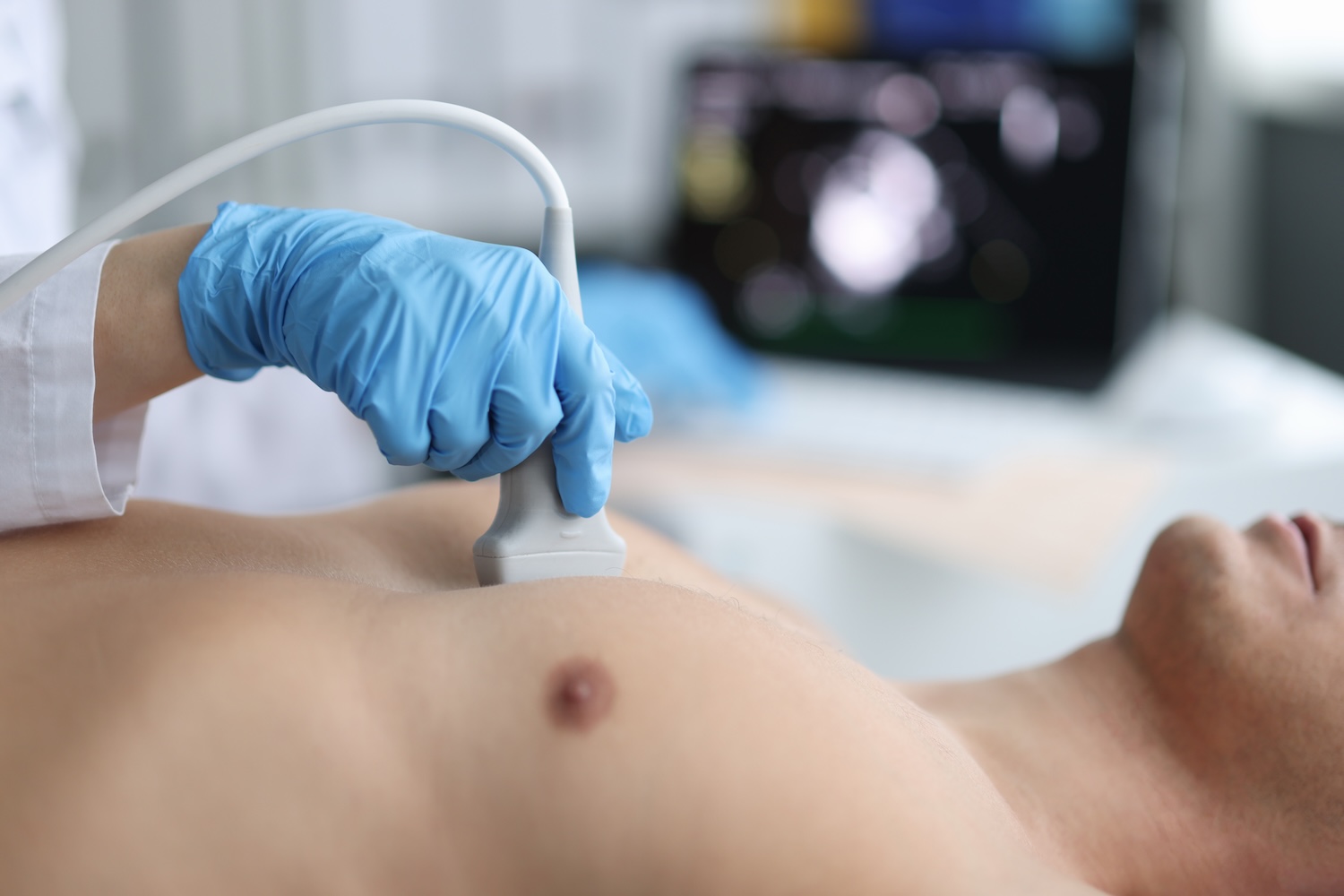Heart Health in High-Definition
Echocardiograms, often referred to as “echo” tests, are a key diagnostic tool in terms of cardiology.
They can assess the structure and function of the heart, aiding in the diagnosis and management of a wide range of cardiac conditions.
This non-invasive and safe imaging technique utilizes sound waves to provide detailed, real-time images of the heart, allowing healthcare professionals to gain valuable information about the health of this vital organ.
Every hour, about 14 Canadian adults aged 20 and over with diagnosed heart disease die
Public Health Agency of Canada, 2022
- Test : Echocardiograms
- Early Detection Of : Heart Disease, Cardiomyopathy, Infective Endocarditis, Pericardial Disease, Valve Disease, Heart Tumors

Echocardiograms
An echocardiogram is a type of ultrasound test that checks the structure and function of your heart.
It is a graphic outline of your heart’s movement.
During the exam, high-frequency sound waves from a hand-held wand placed on your chest are used to take pictures of your heart.. It shows the flow of blood through the heart’s valves and chambers. This helps your healthcare provider evaluate the pumping action of your heart.
An echocardiogram does not use any radiation. This is how it differentiates itself from other tests like X-rays and CT scans that use small amounts of radiation.
Early Detection of Heart Diseases
Cardiomyopathy
Infective Endocarditis
Pericardial Disease
Valve Disease
Benefits of an Echocardiogram
Diagnosis of Heart Conditions
Evaluation of Heart Function
Detection of Abnormalities

Don’t become a statistic.
Invest now in your future health and be fit for the long term.
How an Echocardiogram Works
Step 1: Preparation
Step 2: Placing Electrodes on Your Chest
Step 3: Sound-Wave Wand
Next, your sonographer will place a sound-wave transducer (wand) on several areas of your chest. There will be a small amount of gel on the end of the wand, which will not harm your skin. The gel helps produce clearer pictures.
You may hear swishing sounds throughout the test. This is normal - it means you are hearing blood flowing through your heart as the wand picks up sound. Your sonographer may also ask you to hold your breath for several seconds at a time, or ask you to move into a different position.

Reasons to Get an Echocardiogram
Monitor Symptoms
Check For Heart Disease
Examine Pre-Existing Conditions
Packages
Invest-Med offers thorough health packages designed to meet the individual needs of our patients.
You can choose between a risk-specific package or a comprehensive package to analyze your health and wellbeing.
Our health packages include rapid access to diagnostic testing using state-of-the-art technology, searching for 500+ diseases in the body, including cancer and heart disease.
Each package includes a comprehensive 1 hour physical exam and 1 hour medical review of results with recommendations to achieve optimal health.
Package costs will vary based on individual diagnostic test recommendations. Financing options are available.
Private MRI Health Packages
Full-Body MRI + Metabolic Blood Panel
Package starting at $5,699*
A Full-Body MRI proactively searches for 500 diseases lurking inside the body.
This package evaluates of overall metabolic efficiency by analyzing of a comprehensive range of biomarkers.
- Advanced lipid profiles
- Insulin resistance
- Indicators of inflammation
- Key measures of organ function
All Private MRI packages also include:
- Physician read results
- Long term plan of action
- Ongoing care with referrals
*Package cost will vary based on individual diagnostic test recommendations. Financing options are available.
Full-Body MRI + Cardiac Blood Panel
Package starting at $5,699*
A Full-Body MRI proactively scans the entire body to detect up to 500 hidden diseases.
A series of assessments used to evaluate cardiovascular health.
- Assessment of heart function indicators
- Measurement of cholesterol levels
- Measurement of triglycerides
- Evaluation of key inflammation markers
All Private MRI packages also include:
- Physician read results
- Long term plan of action
- Ongoing care with referrals
*Package cost will vary based on individual diagnostic test recommendations. Financing options are available.
Full-Body MRI + Hormone Blood Panel
Package starting at $5,699*
A Full-Body MRI scan can identify over 500 potential health conditions within the body.
A comprehensive evaluation of overall hormonal health and balance with an in-depth analysis of key hormones.
- Thyroid hormones
- Cortisol and other adrenal hormones
- Estrogen, progesterone, and testosterone
- Insulin levels
All Private MRI packages also include:
- Physician read results
- Long term plan of action
- Ongoing care with referrals
*Package cost will vary based on individual diagnostic test recommendations. Financing options are available.
Full-Body MRI + All 3 Blood Panels
Packages starting at $6,999*
All Private MRI packages also include:
- Physician read results
- Long term plan of action
- Ongoing care with referrals
*Package cost will vary based on individual diagnostic test recommendations. Financing options are available.
Risk-Specific Screening Packages
Cancer Screening Package
Mitigate your cancer risk with preventive screening.
- MRI
- DNA testing – 84 genes for cancer
- Mole mapping
- Advanced blood work
- CT scan
- Virtual colonoscopy
Proactive testing can detect changes in your body that could become cancer.
*Package prices range from $3,999 to $14,999.
Package cost will vary based on individual diagnostic test recommendations. Financing options are available.
Stroke Screening Package
Knowing your risk for stroke can save your life.
- MRA – Magnetic resonance angiography
- DNA testing – 83 genes for heart conditions
- Advanced blood work
- Carotid doppler ultrasound
- Echocardiogram
Detect your risk of stroke early, even before symptoms present themselves.
*Package prices range from $3,999 to $14,999.
Package cost will vary based on individual diagnostic test recommendations. Financing options are available.
Heart Disease Screening Package
Early screenings are essential for heart disease prevention.
- Coronary calcium score
- DNA testing – 83 genes for heart conditions
- Advanced blood work
- Exercise stress test
- Echocardiogram
- CT coronary angiography
Screening for cardiovascular risk factors before you develop heart disease, can help you prevent it.
*Package prices range from $3,999 to $14,999.
Package cost will vary based on individual diagnostic test recommendations. Financing options are available.
Comprehensive Screening Packages
Comprehensive Screening Package
Get the right screening tests at the right time.
- Whole body MRI
- Coronary calcium score
- DEXA scans
- Microbiome gut testing
- Genetic testing+
- Heart health workup
- Cancer risk review
- Mole mapping
- Screen for all material risks
Prevention is key to longevity, whether or not you are presenting symptoms or risk factors.
*Package prices range from $3,999 to $14,999.
Package cost will vary based on individual diagnostic test recommendations. Financing options are available.
Corporate Services
Please contact us for a custom corporate package. Specialized corporate rates available.
- Comprehensive, proactive health plans
- Customized screening tests
- Extensive medical risk assessments
- Preventive approach to healthcare
Proactively manage executive wellness.
FAQ
How long does an echocardiogram take?
How should I prepare for an echocardiogram?
In order to prepare for an echocardiogram, you should complete the following:
- Take your medications as you normally do.
- Wear anything you’d like, as your healthcare provider will ask you to remove your clothing from the waist up.
- Avoid eating or drinking right before the appointment.
What are the risks involved with an echocardiogram?
What techniques are used in echocardiography?
There are several different techniques that could be used to generate pictures of your heart. The best technique depends on your specific condition and what your healthcare provider needs to check for.
These techniques include the following:
Two-dimensional (2D) ultrasound: This is the most commonly used technique. It produces 2D images that appear as “slices” on the computer screen. Traditionally, these slices could be “stacked” to build a 3D structure.
Three-dimensional (3D) ultrasound: Advances in technology have made 3D imaging more efficient and useful. This technique shows different aspects of your heart, such as how well it pumps, with much greater accuracy. Using this technique also allows your healthcare provider to see parts of your heart from different angles.
Doppler ultrasound: This technique allows you to see how fast your blood flows, and in which direction.
Strain imaging: This technique shows changes in how your heart muscle moves. It can catch early signs of certain heart diseases.
What is the difference between an echocardiogram and an EKG?
While an echocardiogram and an EKG both check your heart, they check for different things and produce different types of visuals.
An echocardiogram checks the overall structure and function of your heart, and produces moving images of your heart. On the other hand, an EKG checks your heart’s electrical activity. Instead of pictures, it produces a graph. The lines on this graph reflect your heart rate and rhythm.
What should you not do before an echocardiogram?
You should avoid the following:
- Eating or drinking.
- Smoking or using any nicotine products.
- Drinking coffee or anything that contains caffeine. This includes over-the-counter medications that contain caffeine, as well as decaf drinks, since they still contain a small amount of caffeine.
Learn More
